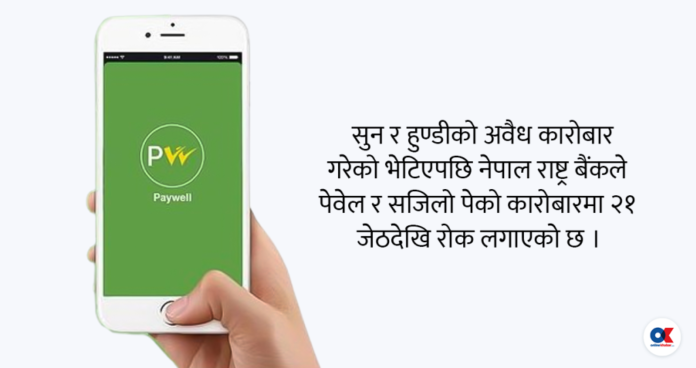[ad_1]
31 May, Kathmandu. The police found evidence that some digital wallets of Nepal were used in smuggling and illegal transactions of hundi.
During the investigation of the 60 kg 617 gram gold smuggling incident, the police found some evidence of the use of digital wallets in the smuggling business from the arrested person.
The Central Investigation Bureau (CIB) of the police is currently detaining 10 people and investigating the matter while implementing the report of the Gold Smuggling Investigation Commission formed by the government. Out of which 4 are Indian, 5 are Nepali and 1 are Chinese nationals.
There are Baijnath Mahadatta Yoyal of India Gujarat, Prashant Ganesh Vajwalkar of India, Siddharth Ashok Gaikwad of India Maharashtra and Dhiraj Dinesh Vait of Maharashtra.
Similarly, among the Nepalese are Kanchaman (Tharkaman) Tamang of Kavre, 52-year-old Surendraman Shrestha of Parsa Birganj, Raju Khatri of Bhaktapur Suryavinayak and Premnath Sedhai of Dhading Siddhalek. Ganga Tasi, a Chinese citizen living as a Buddhist, is also currently in the custody of the CIB.
The CIB has arrested him, suspecting the transaction worth 3.34 billion made by Lal Bahadur Kunwar, the owner of JK Money Transfer in Butwal, an agent of Paywell.
While recovering the details of Indian citizen Siddhanath’s mobile phone from the forensic laboratory, an audio of about 2 minutes was found on Siddhanath’s mobile phone. In that audio, it was said that ‘If you can’t put the money in USD (crypto), then put it in Paywell’.
CIB started further investigation on the suspicion that gold was smuggled and the money was transacted through Paywell after finding a voucher for depositing money in Paywell Nepal’s account on the WhatsApp app.
The CIB has also found out that the person who made Siddharth deposit the money in Paywell is Abhijit Tanaji Molik, an Indian citizen called Pintu, and he runs the Sunchandi Refinery House on New Road in Kathmandu.
Then the CIB team raided Pintu’s shop on 23 Baisakh. After getting the information about Siddharth’s arrest, Pintu closed the refinery house and ran away. CIB has recovered the vouchers worth 1 billion rupees deposited in Paywal’s account from Sunchandi Refinery House. During that time, the police also found evidence of easy-to-pay transactions.
‘After finding the audio and the voucher on the mobile phone, we had some suspicions about the process of smuggling gold. But after the receipts worth billions were found in Pintu’s refinery house, two wallets were found attached to the gold and hundi accounts’, said a CIB official.
Nepal Rastra Bank has stopped the Paywell and Easy Pay transactions on June 21 after illegal trading of gold and hundi was found.
Before the raid, Indian citizens Siddharth, Prashant, Dhiraj and Nepali citizen Raju, who were arrested by CIB, found vouchers for depositing money in Paywell’s account.
5 crore 41 from Dhiraj’s mobile, 5 crore from Siddharth’s mobile, 1 crore from Raju’s mobile were found. According to the investigation officer of CIB, it was found that a total of 1 billion was deposited in Paywell’s account from the 8 people who are currently in custody. Even though the voucher was not found, the police investigation revealed that only Dhiraj put 338.6 million rupees in the paywell.
CIB arrested 6 people from these companies on 25th of June after the smuggling of gold, hundi and crypto were linked to paywell and easy wallet.
Bhimprasad Timilsina, president of Paywell, employees Prajwal Acharya and Suraj Jabra were arrested. CEO Satendra Shrestha is absconding. Easy Peka owner Sunil Zakibanja, Chief Executive Officer Kashyap Manandhar and Athukchak Khampa were arrested. Phunsuk Dagpa Athukchang Khampa, the president of Dasoo Peka, is absconding. CIB AIG Shyamalal Gyawali said that they have been investigated by CIB for crimes under Rashtra Bank Act, customs evasion and theft and organized crime in connection with hundi, gold smuggling, and crypto.
Sources informed that the CIB has started the process for a diffusion notice against Pintu, an Indian citizen who made money to be deposited in Paywell’s name.
CIB claims that Pintu is the main person who buys and sells smuggled gold imported from different countries and conducts illegal transactions through Paywell.
3 billion 34 crore business from Paywell
The CIB has arrested him, suspecting the transaction worth 3.34 billion made by Lal Bahadur Kunwar, the owner of JK Money Transfer in Butwal, an agent of Paywell.
The CIB source informed that the money transfer, which looks normal and the legitimate transactions are also low, was found to have a turnover of nearly 3.5 billion within a year.
82 billion turnover in 1 year
During the CIB’s investigation, it was found that Paywell had a turnover of 82 billion in a period of about one year from 27 April 2023 till now. In which 61 billion 50 million rupees have been collected in cash, out of which only 1 billion vouchers have been found. 4 billion has been transacted through Connect IPS.
Paywell has 1900 agents in Nepal. According to the CIB, 20 of these agents illegally deposited the payment for the purchase of smuggled gold directly into Paywell’s account and transacted through the agent.
The CIB is of the opinion that it is suspicious that the digital wallet does not transfer funds from the mobile phone, but deposits the amount through vouchers.
Only Dhiraj, who is in custody, has been found to have put 338.6 million rupees in the paywell. As mentioned in the Integrated Directive on Payment System, 2080, only Rs 2 lakh per day or Rs 10 lakh in a month can be deposited in the wallet from the bank account.
At the rate of 10 lakh per month, Siddharth can deposit a maximum of 12 million in Paywell wallet in a year. But on the contrary, it has been found that nearly 34 crores of rupees have been deposited in paywell by one person in one year.
How did the illegal transaction through the wallet?
CIB’s investigation has shown that wallets are linked to the payment of gold smuggled into Nepal and the payment of remittances sent from abroad.
In particular, it has been revealed that money laundering and hundi transactions are carried out by making money to be deposited in the wallet settlement and operational accounts in two ways.
It has been found that after someone buys the smuggled gold, the payment amount is directly deposited into the bank accounts of these two wallets.
Then the deposit voucher is sent to Paywell agent. Agents have the facility to exchange vouchers. National Bank’s Integrated Payment System Directive, 2080, mentions about wallet transactions through agents.
“Customers can deposit cash up to Rs. 25,000 per day and up to Rs. 1 lakh per month through an authorized agent appointed by the relevant payment service provider in the wallet,” said the instruction.
This means that people who do not have an account in any other bank can top up their paywall wallet through an agent. But by taking advantage of it, it has been found that not 25000 but crores of rupees are collected daily.
Paywell has 1900 agents in Nepal. According to the CIB, 20 of these agents illegally deposited the payment for the purchase of smuggled gold directly into Paywell’s account and transacted through the agent.
The amount collected from the purchase of smuggled gold is now transferred by Paywell’s agents to the account of the person who sent the money to Nepal from abroad.
‘Money from abroad does not come here. After selling the smuggled gold and paying through Paywell, the money is deposited in the account of the Nepali who sends it from abroad through Paywell’s agent. It seems that the money sent from abroad has reached the place where gold is bought from there,” said Gyawali, AIG of CIB.
Kunwar of JK Money Transfer was arrested for working in this style. According to the CIB, this style was used especially for the money sent from Dubai, Korea and Australia.
On the other hand, it seems to work using the wallet’s operational account. The operational account is opened for the purpose of using it for the daily expenses of the office, salaries and furniture. It is considered valid to deposit money in that account only by people who are connected to Paywell in one way or another.
But according to CIB, it has been found that money has been deposited in the operational account even from people who are not related to Paywell.
2.5 lakhs reporting when e-money is 8 crores
Paywell was also found to have made false reporting to its settlement bank, Kumari Bank. An employee of Rashtra Bank said that false reporting was done by showing the low rate of e-money. Paywell’s account was frozen by the National Bank on 21st May.
At that time, Paywell’s e-money of 80 million, i.e. total user amount was 80 million. Wallets should inform settlement bank about daily transactions. But when Paywell informed Kumari Bank, it was found that it reported only 2.5 million instead of 80 million, an employee of Rashtra Bank told Online Khabar.
Paywell gets the facility of keeping less amount in the settlement bank after reporting less despite having more transactions. The wallet company has to keep an amount equal to the amount of e-money in the settlement bank so that the customer’s money does not get lost. But it has been found that Paywell keeps a low amount by showing a low amount despite having a high turnover.
Only the wallet company, not the bank, has a role in the amount shown in the e-money i.e. wallet. According to an investigation officer of CIB, Paywell also manipulated whether to show/not show the amount in the wallet or how much amount to show. According to the CIB, it was found that Paywell made e-money in the wallets of some people who gave many businesses even if they did not have funds in their wallets.
[ad_2]





